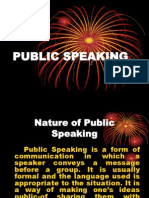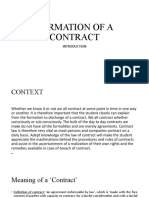Speech Communication
Speech Communication
Uploaded by
DAWA JAMES GASSIMCopyright:
Available Formats
Speech Communication
Speech Communication
Uploaded by
DAWA JAMES GASSIMOriginal Description:
Copyright
Available Formats
Share this document
Did you find this document useful?
Is this content inappropriate?
Copyright:
Available Formats
Speech Communication
Speech Communication
Uploaded by
DAWA JAMES GASSIMCopyright:
Available Formats
ENGLISH LANGUAGE
Communication: Speech Communication.
Why Study Speech Communication?
The benefits of good speech communication are clear. It can help you learn, make
decisions, enjoy yourself, and succeed in your chosen career. The eight basic skills for becoming
an effective communicator, as listed; are also clear. With these factors in mind, you may ask why
you should take this course to practice something you have been doing every day for years? Why
not just continue speaking, keeping these eight factors in mind?
Salient issues and questions.
• Do you sometimes have trouble choosing the best words to express your ideas?
• Have you ever spoken without preparing your remarks carefully?
• Do you ever have difficulty paying attention when others speak?
• Do people ever ask you to repeat something because they could not hear or understand
what you said the first time?
• Have you ever been asked to give a speech or act in a play and refused out of timidity?
• Have some of your in-class reports over the years fallen a bit flat because of the way you
presented them?
• Do you sometimes feel like your friends do not listen to what you say?
• Can you argue effectively and logically with someone?
• Do you have difficulty remembering a speaker's main points several hours after hearing a
speech?
(SPEECH, EXPLORING COMMUNICATION - J REGIS O'CONNOR)
What makes an effective speech Communicator?
(Discuss with a colleague)
Tips for speech communication Quality (Adapted From SPEECH, EXPLORING COMMUNICATION - J
REGIS O'CONNOR)
1. Sincerity Effective speech communicators must be sincere. That is, they must
themselves believe in what they say. Other people must believe they mean what they say
in order for communication to be successful in the long run.
2. Knowledge Effective speech communicators must speak knowledgeably. Whether
talking in a small group meeting, giving a public speech to a large crowd, or in one-to-
one conversation, speakers should know enough about the subject to make it worthwhile
for people to listen. At other times, little advance preparation is needed. In any case, to be
an effective speaker you must be able to speak with confidence and knowledge about
your subject.
3. Organization Effective speech communicators must be well organized. Some speakers
are like the man who jumped on a horse and rode off first in one direction then in
another. The rider wound up going nowhere and it definitely confused the horse! A clear
message begins with definite purpose and proceeds in a single direction to the end.
4. Listening Effective speech communicators must know how and when to listen. At
least half of the oral communication process involves listening. Occasionally you may
talk to yourself, but most often you expect someone to be listening when you speak.
Effective communicators know they may learn more during their listening time than
when they are speaking. Good listening is often neglected, but a good speaker will
remember this important "flip side" of the speaking process.
5. Confidence Effective speech communicators must be confident. Building confidence
as a speaker and controlling stage fright are not accomplished overnight. But a course in
speech, and experience in communicating with others are two of the best ways to achieve
the needed confidence.
6. Language Effective speech communicators must use language carefully. A speaker's
choice of words can make the difference in whether or not the message is received and
understood as the speaker intends it to be. Learning to choose the best words to suit a
particular audience and occasion is one of the most difficult tasks for a speaker. It is also
what separates great speakers from the rest.
7. Nonverbal Communication Effective speech communicators must make good use of
nonverbal communication. Speakers "say" a great deal with the tone of their voice, their
body movements, and their eyes. Even clothes and grooming communicate to others.
Good communicators are aware of what they are communicating nonverbally as well as
verbally.
8. Goal Setting Effective speech communicators will generally be able to reach certain
goals. When an effective speaker presents information about a topic, the receivers will
almost always know more about the topic after listening than they did before. If a skilled
speaker tries to convince an audience to accept his or her solution to a problem, the
listeners will generally be partially or fully convinced.
Please add to the list.
Emmanuel Ssewakilyanga Kiwanuka.
You might also like
- Definition of Listening SkillsDocument5 pagesDefinition of Listening SkillsRezinna Sebongbong89% (9)
- How To Write A Speech PDFDocument7 pagesHow To Write A Speech PDFDAWA JAMES GASSIMNo ratings yet
- LLB Fundamentals of Criminal Law NotesDocument127 pagesLLB Fundamentals of Criminal Law NotesDAWA JAMES GASSIMNo ratings yet
- Uganda Christian University: Constitutional History NotesDocument42 pagesUganda Christian University: Constitutional History NotesDAWA JAMES GASSIM100% (3)
- Mock LET QuestionDocument24 pagesMock LET Questionarlenegomito100% (18)
- Wlpan BookDocument208 pagesWlpan Bookdwfunnell100% (4)
- Employability Skills Enhancement Module (ESEM) Model Student HandbookDocument97 pagesEmployability Skills Enhancement Module (ESEM) Model Student HandbooksrivenramanNo ratings yet
- Week 7Document9 pagesWeek 7jeo nalugonNo ratings yet
- Speakingskills 130802202243 Phpapp02Document7 pagesSpeakingskills 130802202243 Phpapp02Shehzad AliNo ratings yet
- What Are Communication Strategies?Document5 pagesWhat Are Communication Strategies?Gayathri VidhyasagarNo ratings yet
- Public SpeakingDocument33 pagesPublic SpeakingLucille Abuy100% (2)
- SpeakingDocument9 pagesSpeakingankit.biswas.2024No ratings yet
- Semi-Final Module in Interactive EnglishDocument14 pagesSemi-Final Module in Interactive EnglishChristine ApariciNo ratings yet
- Speaking Skills For CommunicationDocument7 pagesSpeaking Skills For CommunicationsobanNo ratings yet
- Factors Affecting Personality DevelopmentDocument38 pagesFactors Affecting Personality DevelopmentLalaine Bobiles MedinaNo ratings yet
- Why Is Public Speaking Important?Document4 pagesWhy Is Public Speaking Important?Sonia MultaniNo ratings yet
- Retorica KursDocument51 pagesRetorica Kursstefadmar adinetNo ratings yet
- Learning Activity Sheet in English 8: A. Most Essential Learning CompetencyDocument8 pagesLearning Activity Sheet in English 8: A. Most Essential Learning CompetencyMaricel sinfuegoNo ratings yet
- Speaking Skill 1Document2 pagesSpeaking Skill 1Isaac CoxxNo ratings yet
- Sodapdf Converted Purposive Communication Module 5Document9 pagesSodapdf Converted Purposive Communication Module 5Jonnel BalizaNo ratings yet
- Effective SpeakingDocument51 pagesEffective Speaking69Sutanu Mukherjee100% (1)
- Learners Packet 2nd Quarter Week 8Document6 pagesLearners Packet 2nd Quarter Week 8xxnicollzcookiesxxNo ratings yet
- English10 Q2 Week7 8Document3 pagesEnglish10 Q2 Week7 8John Cyrus DizonNo ratings yet
- Listening SkillsDocument14 pagesListening SkillsRoslan AlliNo ratings yet
- Unit 2: Verbal CommunicationDocument23 pagesUnit 2: Verbal CommunicationrahulmanjareNo ratings yet
- Speech Accrdg To PurposeDocument2 pagesSpeech Accrdg To Purposegabrielhermoso58No ratings yet
- How To Improve Speaking SkillsDocument9 pagesHow To Improve Speaking SkillsGolam Mowla SwaponNo ratings yet
- Public Speaking Rda MidtermDocument6 pagesPublic Speaking Rda MidtermHannah Zoe MongayaNo ratings yet
- 08 - Chetna - Raj - Speaking Skills and Understanding Essentials of Spoken CommunicationDocument20 pages08 - Chetna - Raj - Speaking Skills and Understanding Essentials of Spoken CommunicationChetna RajNo ratings yet
- Fundamentals of Verbal CommunicationDocument10 pagesFundamentals of Verbal CommunicationChristian Luis De GuzmanNo ratings yet
- LC9. Public SpeakingDocument44 pagesLC9. Public SpeakingReyven Mellendrez100% (3)
- Lecture Notes Business Communication Unit IV BBADocument17 pagesLecture Notes Business Communication Unit IV BBAAmit Kumar100% (1)
- Interpersonal Skills Tutorial Class 1&2Document24 pagesInterpersonal Skills Tutorial Class 1&2Raj KumarNo ratings yet
- 33222intro To Public SpeakingDocument25 pages33222intro To Public SpeakingNoman100% (1)
- 2oral Com Week 9 Principles of Speech DeliveryDocument43 pages2oral Com Week 9 Principles of Speech DeliveryMardelyn Dizon50% (2)
- English 10 1Document24 pagesEnglish 10 1Janna AlindoganNo ratings yet
- Public Speaking Lesson PlanDocument6 pagesPublic Speaking Lesson PlanTrixie ArceoNo ratings yet
- Presenation File English 666Document31 pagesPresenation File English 666Akshat GuptaNo ratings yet
- TEFL How To Teach SpeakingDocument4 pagesTEFL How To Teach Speakingsilva.angraini26No ratings yet
- Module 11 GE 005 Purposive CommunicationDocument10 pagesModule 11 GE 005 Purposive CommunicationJordan DioquinoNo ratings yet
- Principles in Effective Oral Communication PDFDocument23 pagesPrinciples in Effective Oral Communication PDFMariel PadayNo ratings yet
- English LessonDocument33 pagesEnglish LessonMikaella Jade MempinNo ratings yet
- ENG 111 UNIT 2 Module 1Document18 pagesENG 111 UNIT 2 Module 1JOHN PAUL AQUINONo ratings yet
- Group 5 Communication For Various PurposesDocument15 pagesGroup 5 Communication For Various PurposesAdrienne MojicaNo ratings yet
- Oral Comm Q2 Wk7Document12 pagesOral Comm Q2 Wk7Kearl MandaoNo ratings yet
- Public Speaking 2.0Document24 pagesPublic Speaking 2.0Roseann MarañaNo ratings yet
- Listening and Speaking SkillsDocument15 pagesListening and Speaking Skillssamphorsphea9No ratings yet
- Speaking SkillDocument7 pagesSpeaking SkillamarbinmansorNo ratings yet
- Qualities of A Good SpeakerDocument7 pagesQualities of A Good SpeakerKanshi BhoynaNo ratings yet
- VCL - Chapter 1Document26 pagesVCL - Chapter 1tanayapatilNo ratings yet
- Speaking Skills: Group 12 1.kurniawan Ramadhan 2.rosalia FebrianaDocument9 pagesSpeaking Skills: Group 12 1.kurniawan Ramadhan 2.rosalia FebrianaMuharam sanitarianNo ratings yet
- Unit 2 - Public SpeechDocument48 pagesUnit 2 - Public Speechrishu jainNo ratings yet
- Alw Effective Listening Powerpoint Draft Dec30Document31 pagesAlw Effective Listening Powerpoint Draft Dec30Muhammad ALI Noor100% (1)
- English 8 q4 w3bDocument3 pagesEnglish 8 q4 w3bCatherine OrdinarioNo ratings yet
- SEC 1 Communication Skills NotesDocument5 pagesSEC 1 Communication Skills Notesknowledgezone8242No ratings yet
- Topic 1 - Basic of Public SpeakingDocument12 pagesTopic 1 - Basic of Public SpeakingAna SofeaNo ratings yet
- Pink Cute Simple Group Project Presentation - 20241108 - 075403 - 0000Document31 pagesPink Cute Simple Group Project Presentation - 20241108 - 075403 - 0000Jea Anne Parman reyesNo ratings yet
- Week 7 - 063951Document28 pagesWeek 7 - 063951Jeniel CorrosNo ratings yet
- Report PurposiveDocument7 pagesReport PurposiveDarnasaur100% (1)
- Speaking Skills (43 PPTS) N (Principal of Effective CommunicationDocument44 pagesSpeaking Skills (43 PPTS) N (Principal of Effective Communicationkrishnanshu sarafNo ratings yet
- Speech and Conversation: Prepared By: Jarren N. Navarro April Ann Bausa Inna RanievaDocument23 pagesSpeech and Conversation: Prepared By: Jarren N. Navarro April Ann Bausa Inna RanievaRAMIREZ, KRISHA R.No ratings yet
- Soft Skills: Unit - 4 (Presentation & Interaction Skills)Document10 pagesSoft Skills: Unit - 4 (Presentation & Interaction Skills)Aisika TyagiNo ratings yet
- Summary of Dale Carnegie's How to Develop Self-Confidence and Improve Public SpeakingFrom EverandSummary of Dale Carnegie's How to Develop Self-Confidence and Improve Public SpeakingNo ratings yet
- Public Speaking: 10 Simple Methods to Build Confidence, Overcome Shyness, Increase Persuasion and Become Great at Public SpeakingFrom EverandPublic Speaking: 10 Simple Methods to Build Confidence, Overcome Shyness, Increase Persuasion and Become Great at Public SpeakingNo ratings yet
- How To Standout During Office/Work Meetings: 15 Secrets Of The Highly Effective PeopleFrom EverandHow To Standout During Office/Work Meetings: 15 Secrets Of The Highly Effective PeopleNo ratings yet
- 1-17 Legal Research MethodDocument16 pages1-17 Legal Research MethodDAWA JAMES GASSIMNo ratings yet
- Legal Skills For First Year Law Students: Too Little, Too Late?Document30 pagesLegal Skills For First Year Law Students: Too Little, Too Late?DAWA JAMES GASSIMNo ratings yet
- The Burden of Proof and Its Role in ArgumentationDocument24 pagesThe Burden of Proof and Its Role in ArgumentationDAWA JAMES GASSIMNo ratings yet
- How To Moot PDFDocument1 pageHow To Moot PDFDAWA JAMES GASSIMNo ratings yet
- CSL 2601 DiscussiondocumentDocument17 pagesCSL 2601 DiscussiondocumentDAWA JAMES GASSIMNo ratings yet
- Exam 2015, Questions and Answers - Quiz 1 Exam 2015, Questions and Answers - Quiz 1Document10 pagesExam 2015, Questions and Answers - Quiz 1 Exam 2015, Questions and Answers - Quiz 1DAWA JAMES GASSIMNo ratings yet
- Definition of ContractDocument35 pagesDefinition of ContractDAWA JAMES GASSIMNo ratings yet
- Contract Law Chapter 2 PDFDocument10 pagesContract Law Chapter 2 PDFDAWA JAMES GASSIMNo ratings yet
- Principles of Criminal Law - Notes: Week 1Document9 pagesPrinciples of Criminal Law - Notes: Week 1DAWA JAMES GASSIMNo ratings yet
- Agricultural Land Contract and Management Rights: Transferring Price and Countermeasures in Typical Agricultural Areas of ChinaDocument8 pagesAgricultural Land Contract and Management Rights: Transferring Price and Countermeasures in Typical Agricultural Areas of ChinaDAWA JAMES GASSIMNo ratings yet
- Instruction Notes. DKDocument57 pagesInstruction Notes. DKDAWA JAMES GASSIMNo ratings yet
- Criminal Law General Provisions Course Notes: February 2020Document68 pagesCriminal Law General Provisions Course Notes: February 2020DAWA JAMES GASSIMNo ratings yet
- The Role of A Lawyer in SocietyDocument16 pagesThe Role of A Lawyer in SocietyDAWA JAMES GASSIMNo ratings yet
- Presentation1FORMATION OF A CONTRACTS OFFERDocument30 pagesPresentation1FORMATION OF A CONTRACTS OFFERDAWA JAMES GASSIM100% (2)
- Course: Introduction To Legal Theory and Its ApplicationsDocument18 pagesCourse: Introduction To Legal Theory and Its ApplicationsDAWA JAMES GASSIMNo ratings yet
- Formation of A Contract - IntroductionDocument16 pagesFormation of A Contract - IntroductionDAWA JAMES GASSIMNo ratings yet
- SLAW IT Outline PDFDocument3 pagesSLAW IT Outline PDFDAWA JAMES GASSIMNo ratings yet
- Stice Christopher Madr A Ama :: Sion of HonDocument19 pagesStice Christopher Madr A Ama :: Sion of HonDAWA JAMES GASSIMNo ratings yet
- UgandaLawReports PDFDocument7 pagesUgandaLawReports PDFDAWA JAMES GASSIMNo ratings yet
- EDEL453 Spring2013 GregWINIEWICZ Unit 1 Geography DAY 1Document3 pagesEDEL453 Spring2013 GregWINIEWICZ Unit 1 Geography DAY 1citydarockstarNo ratings yet
- (Atlantis Ambient and Pervasive Intelligence 9) Simon Elias Bibri (auth.)-The Human Face of Ambient Intelligence_ Cognitive, Emotional, Affective, Behavioral and Conversational Aspects-Atlantis Press .pdfDocument545 pages(Atlantis Ambient and Pervasive Intelligence 9) Simon Elias Bibri (auth.)-The Human Face of Ambient Intelligence_ Cognitive, Emotional, Affective, Behavioral and Conversational Aspects-Atlantis Press .pdfVedaYanthiNo ratings yet
- ASSESSMENT - Chap 2.lesson 3.guidelines in Performance AssessmentDocument11 pagesASSESSMENT - Chap 2.lesson 3.guidelines in Performance Assessmentaiysha-azreyh mohammadaliNo ratings yet
- Language Cognitive PsychologyDocument28 pagesLanguage Cognitive PsychologyRica AbesamisNo ratings yet
- CEFR A2 Learning OutcomesDocument8 pagesCEFR A2 Learning OutcomesPhairouse Abdul Salam100% (1)
- 7-2 04 Macaro - AristotleDocument3 pages7-2 04 Macaro - AristotlethebestNo ratings yet
- WHLP English 4 q1 WK 1 8 1Document13 pagesWHLP English 4 q1 WK 1 8 1Teacher Irish LaquiNo ratings yet
- PHRASAL VERBS Verb + Adverbial Particle And/or PrepositionDocument6 pagesPHRASAL VERBS Verb + Adverbial Particle And/or PrepositionMelissa WhiteNo ratings yet
- Deep Learning in Lie Detector and Brain FingerprintingDocument11 pagesDeep Learning in Lie Detector and Brain FingerprintingSHUBHANGI SHARMANo ratings yet
- Adolescence 1.0Document15 pagesAdolescence 1.0ManuelNo ratings yet
- Learning Plan in EAPP Quarter 1 Module 1 Lesson 2 Text StructureDocument4 pagesLearning Plan in EAPP Quarter 1 Module 1 Lesson 2 Text StructureJeremay Albos AndagaoNo ratings yet
- DTLD ScoringDocument8 pagesDTLD Scoringblessy jonesNo ratings yet
- Andra Blessed Kesson - Students Perception and Utilization of Counseling in Ghana. A Case Study of The Accra Metropolis - 2013Document155 pagesAndra Blessed Kesson - Students Perception and Utilization of Counseling in Ghana. A Case Study of The Accra Metropolis - 2013Kabulja RichardNo ratings yet
- العاب الكترونيةDocument45 pagesالعاب الكترونيةDR.M YOUNISNo ratings yet
- ListeningDocument8 pagesListeningayza rajpoootNo ratings yet
- Lau Rosenthal Empirical Support For Higher Order Theories of Conscious Awareness PDFDocument9 pagesLau Rosenthal Empirical Support For Higher Order Theories of Conscious Awareness PDFkarlunchoNo ratings yet
- Glossary-Heidegger Being and TimeDocument47 pagesGlossary-Heidegger Being and TimeAljean PardinasNo ratings yet
- A Christmas Memory. Lesson - AnthologyDocument24 pagesA Christmas Memory. Lesson - AnthologySherry CallisonNo ratings yet
- 3R Article Assignment Q1!24!25Document4 pages3R Article Assignment Q1!24!25emailvishhereNo ratings yet
- Structure, Sign, and Play in The Discourse of The Human SciencesDocument14 pagesStructure, Sign, and Play in The Discourse of The Human SciencesPramod Enthralling EnnuiNo ratings yet
- Lecture On Paragraph Writing Main - Spring 2023Document32 pagesLecture On Paragraph Writing Main - Spring 2023Muneeb AshrafNo ratings yet
- IMRaD Journal Article TemplateDocument4 pagesIMRaD Journal Article TemplateLance AvenioNo ratings yet
- Context-Free Languages and Pushdown AutomataDocument9 pagesContext-Free Languages and Pushdown AutomataAbhishek GambhirNo ratings yet
- The Role of The School Psychologist in The Inclusive EducationDocument20 pagesThe Role of The School Psychologist in The Inclusive EducationCortés PameliNo ratings yet
- Parts of Speech QuizDocument2 pagesParts of Speech QuizEsaKhanNo ratings yet
- Suggested Activitiesabc (September)Document3 pagesSuggested Activitiesabc (September)Christina RollonNo ratings yet
- Lesson 1 Educational Paradigm ShiftDocument10 pagesLesson 1 Educational Paradigm ShiftYnie QuezmaldesNo ratings yet
- Post Structuralism TheoryDocument8 pagesPost Structuralism TheoryharoonNo ratings yet















































































































